LW403: Report on English Legal System: Interpretation and Rules
VerifiedAdded on 2023/06/05
|9
|2754
|293
Report
AI Summary
This report provides an overview of the English Legal System, focusing on statutory and judicial interpretation. It explores the rules for interpreting statutes, including the literal rule, golden rule, mischief rule, and purposive approach, and how judges apply them in practice. The report examines these rules through case examples, such as Fisher v Bell and R v Allen, illustrating their application and impact. Furthermore, it discusses the significance of these interpretation methods in understanding the intention of the legislature and the evolution of legal principles. The report also highlights the role of judges in interpreting the law and the importance of these rules in providing a framework for consistent application of the law. The report emphasizes the importance of statutory and judicial interpretation in ensuring the effective and fair application of the law within the English legal system.

LW403 ENGLISH LEGAL
SYSTEM
SYSTEM
Paraphrase This Document
Need a fresh take? Get an instant paraphrase of this document with our AI Paraphraser
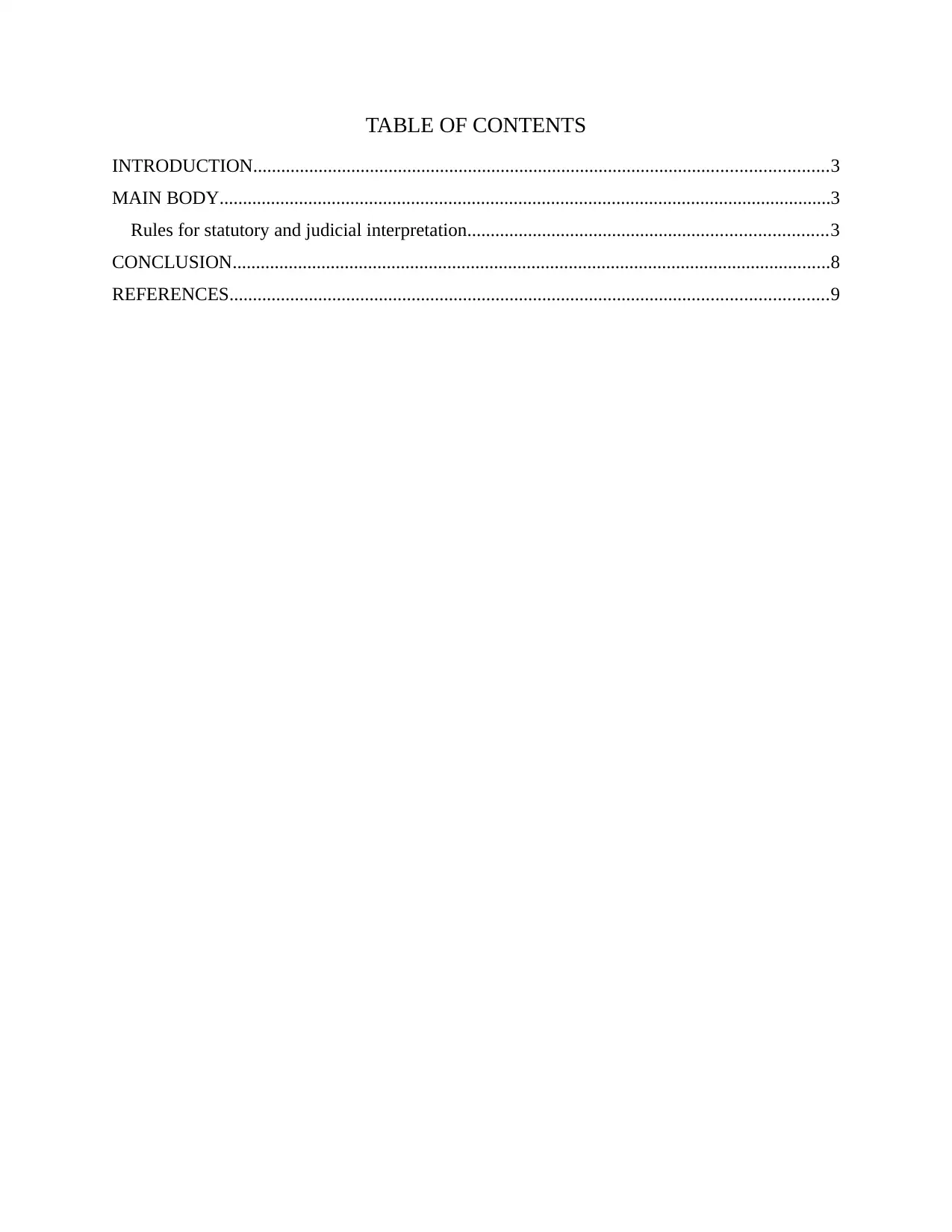
TABLE OF CONTENTS
INTRODUCTION...........................................................................................................................3
MAIN BODY...................................................................................................................................3
Rules for statutory and judicial interpretation.............................................................................3
CONCLUSION................................................................................................................................8
REFERENCES................................................................................................................................9
INTRODUCTION...........................................................................................................................3
MAIN BODY...................................................................................................................................3
Rules for statutory and judicial interpretation.............................................................................3
CONCLUSION................................................................................................................................8
REFERENCES................................................................................................................................9
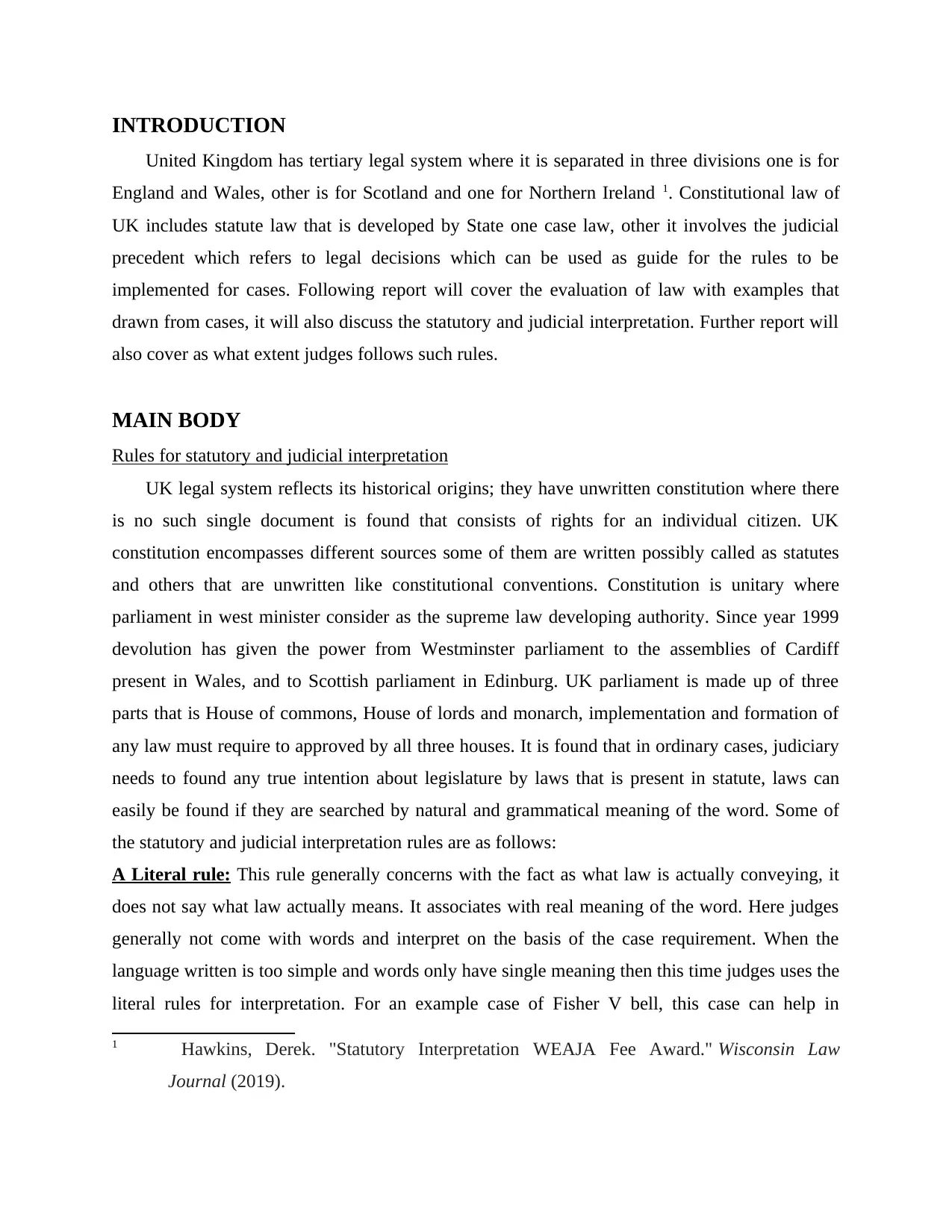
INTRODUCTION
United Kingdom has tertiary legal system where it is separated in three divisions one is for
England and Wales, other is for Scotland and one for Northern Ireland 1. Constitutional law of
UK includes statute law that is developed by State one case law, other it involves the judicial
precedent which refers to legal decisions which can be used as guide for the rules to be
implemented for cases. Following report will cover the evaluation of law with examples that
drawn from cases, it will also discuss the statutory and judicial interpretation. Further report will
also cover as what extent judges follows such rules.
MAIN BODY
Rules for statutory and judicial interpretation
UK legal system reflects its historical origins; they have unwritten constitution where there
is no such single document is found that consists of rights for an individual citizen. UK
constitution encompasses different sources some of them are written possibly called as statutes
and others that are unwritten like constitutional conventions. Constitution is unitary where
parliament in west minister consider as the supreme law developing authority. Since year 1999
devolution has given the power from Westminster parliament to the assemblies of Cardiff
present in Wales, and to Scottish parliament in Edinburg. UK parliament is made up of three
parts that is House of commons, House of lords and monarch, implementation and formation of
any law must require to approved by all three houses. It is found that in ordinary cases, judiciary
needs to found any true intention about legislature by laws that is present in statute, laws can
easily be found if they are searched by natural and grammatical meaning of the word. Some of
the statutory and judicial interpretation rules are as follows:
A Literal rule: This rule generally concerns with the fact as what law is actually conveying, it
does not say what law actually means. It associates with real meaning of the word. Here judges
generally not come with words and interpret on the basis of the case requirement. When the
language written is too simple and words only have single meaning then this time judges uses the
literal rules for interpretation. For an example case of Fisher V bell, this case can help in
1 Hawkins, Derek. "Statutory Interpretation WEAJA Fee Award." Wisconsin Law
Journal (2019).
United Kingdom has tertiary legal system where it is separated in three divisions one is for
England and Wales, other is for Scotland and one for Northern Ireland 1. Constitutional law of
UK includes statute law that is developed by State one case law, other it involves the judicial
precedent which refers to legal decisions which can be used as guide for the rules to be
implemented for cases. Following report will cover the evaluation of law with examples that
drawn from cases, it will also discuss the statutory and judicial interpretation. Further report will
also cover as what extent judges follows such rules.
MAIN BODY
Rules for statutory and judicial interpretation
UK legal system reflects its historical origins; they have unwritten constitution where there
is no such single document is found that consists of rights for an individual citizen. UK
constitution encompasses different sources some of them are written possibly called as statutes
and others that are unwritten like constitutional conventions. Constitution is unitary where
parliament in west minister consider as the supreme law developing authority. Since year 1999
devolution has given the power from Westminster parliament to the assemblies of Cardiff
present in Wales, and to Scottish parliament in Edinburg. UK parliament is made up of three
parts that is House of commons, House of lords and monarch, implementation and formation of
any law must require to approved by all three houses. It is found that in ordinary cases, judiciary
needs to found any true intention about legislature by laws that is present in statute, laws can
easily be found if they are searched by natural and grammatical meaning of the word. Some of
the statutory and judicial interpretation rules are as follows:
A Literal rule: This rule generally concerns with the fact as what law is actually conveying, it
does not say what law actually means. It associates with real meaning of the word. Here judges
generally not come with words and interpret on the basis of the case requirement. When the
language written is too simple and words only have single meaning then this time judges uses the
literal rules for interpretation. For an example case of Fisher V bell, this case can help in
1 Hawkins, Derek. "Statutory Interpretation WEAJA Fee Award." Wisconsin Law
Journal (2019).
⊘ This is a preview!⊘
Do you want full access?
Subscribe today to unlock all pages.

Trusted by 1+ million students worldwide
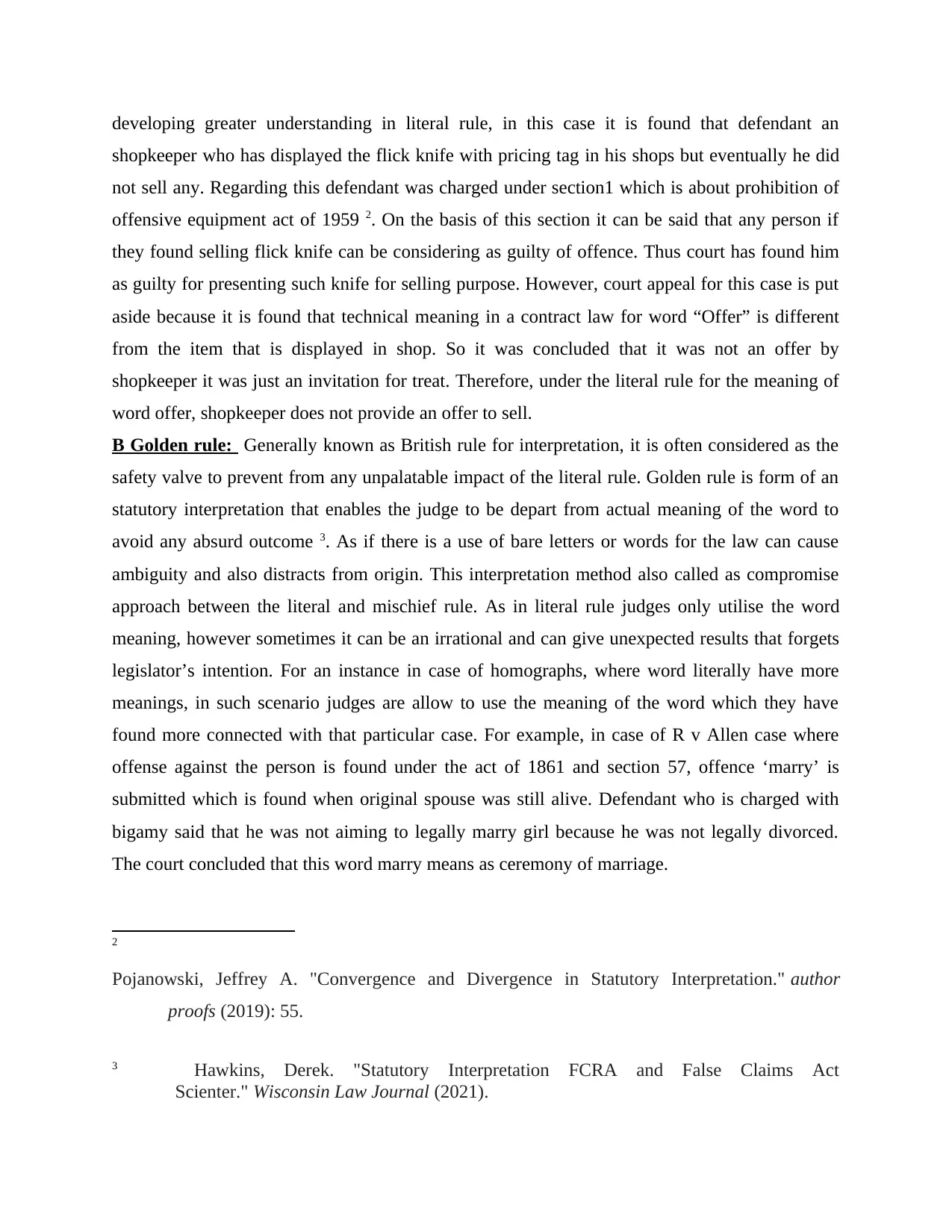
developing greater understanding in literal rule, in this case it is found that defendant an
shopkeeper who has displayed the flick knife with pricing tag in his shops but eventually he did
not sell any. Regarding this defendant was charged under section1 which is about prohibition of
offensive equipment act of 1959 2. On the basis of this section it can be said that any person if
they found selling flick knife can be considering as guilty of offence. Thus court has found him
as guilty for presenting such knife for selling purpose. However, court appeal for this case is put
aside because it is found that technical meaning in a contract law for word “Offer” is different
from the item that is displayed in shop. So it was concluded that it was not an offer by
shopkeeper it was just an invitation for treat. Therefore, under the literal rule for the meaning of
word offer, shopkeeper does not provide an offer to sell.
B Golden rule: Generally known as British rule for interpretation, it is often considered as the
safety valve to prevent from any unpalatable impact of the literal rule. Golden rule is form of an
statutory interpretation that enables the judge to be depart from actual meaning of the word to
avoid any absurd outcome 3. As if there is a use of bare letters or words for the law can cause
ambiguity and also distracts from origin. This interpretation method also called as compromise
approach between the literal and mischief rule. As in literal rule judges only utilise the word
meaning, however sometimes it can be an irrational and can give unexpected results that forgets
legislator’s intention. For an instance in case of homographs, where word literally have more
meanings, in such scenario judges are allow to use the meaning of the word which they have
found more connected with that particular case. For example, in case of R v Allen case where
offense against the person is found under the act of 1861 and section 57, offence ‘marry’ is
submitted which is found when original spouse was still alive. Defendant who is charged with
bigamy said that he was not aiming to legally marry girl because he was not legally divorced.
The court concluded that this word marry means as ceremony of marriage.
2
Pojanowski, Jeffrey A. "Convergence and Divergence in Statutory Interpretation." author
proofs (2019): 55.
3 Hawkins, Derek. "Statutory Interpretation FCRA and False Claims Act
Scienter." Wisconsin Law Journal (2021).
shopkeeper who has displayed the flick knife with pricing tag in his shops but eventually he did
not sell any. Regarding this defendant was charged under section1 which is about prohibition of
offensive equipment act of 1959 2. On the basis of this section it can be said that any person if
they found selling flick knife can be considering as guilty of offence. Thus court has found him
as guilty for presenting such knife for selling purpose. However, court appeal for this case is put
aside because it is found that technical meaning in a contract law for word “Offer” is different
from the item that is displayed in shop. So it was concluded that it was not an offer by
shopkeeper it was just an invitation for treat. Therefore, under the literal rule for the meaning of
word offer, shopkeeper does not provide an offer to sell.
B Golden rule: Generally known as British rule for interpretation, it is often considered as the
safety valve to prevent from any unpalatable impact of the literal rule. Golden rule is form of an
statutory interpretation that enables the judge to be depart from actual meaning of the word to
avoid any absurd outcome 3. As if there is a use of bare letters or words for the law can cause
ambiguity and also distracts from origin. This interpretation method also called as compromise
approach between the literal and mischief rule. As in literal rule judges only utilise the word
meaning, however sometimes it can be an irrational and can give unexpected results that forgets
legislator’s intention. For an instance in case of homographs, where word literally have more
meanings, in such scenario judges are allow to use the meaning of the word which they have
found more connected with that particular case. For example, in case of R v Allen case where
offense against the person is found under the act of 1861 and section 57, offence ‘marry’ is
submitted which is found when original spouse was still alive. Defendant who is charged with
bigamy said that he was not aiming to legally marry girl because he was not legally divorced.
The court concluded that this word marry means as ceremony of marriage.
2
Pojanowski, Jeffrey A. "Convergence and Divergence in Statutory Interpretation." author
proofs (2019): 55.
3 Hawkins, Derek. "Statutory Interpretation FCRA and False Claims Act
Scienter." Wisconsin Law Journal (2021).
Paraphrase This Document
Need a fresh take? Get an instant paraphrase of this document with our AI Paraphraser
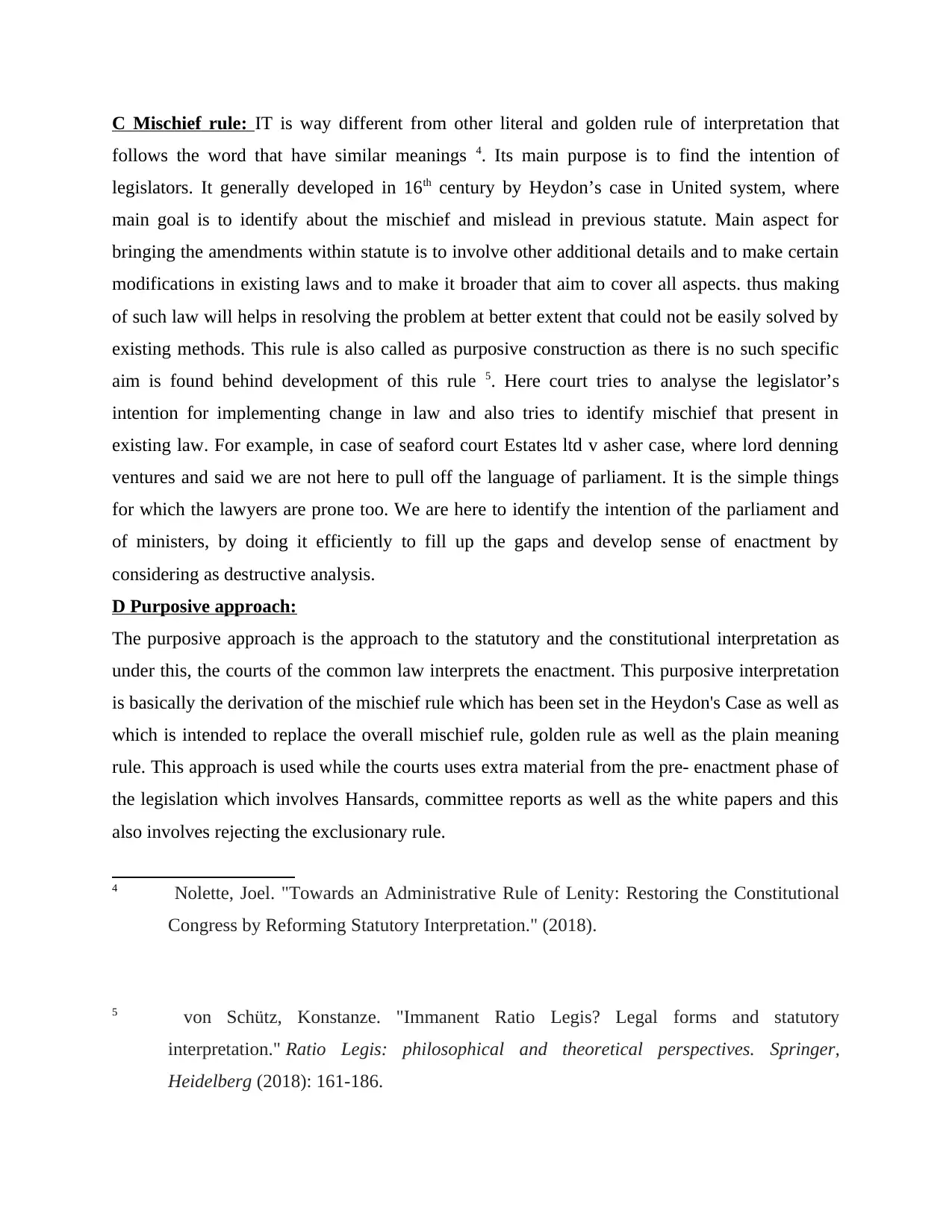
C Mischief rule: IT is way different from other literal and golden rule of interpretation that
follows the word that have similar meanings 4. Its main purpose is to find the intention of
legislators. It generally developed in 16th century by Heydon’s case in United system, where
main goal is to identify about the mischief and mislead in previous statute. Main aspect for
bringing the amendments within statute is to involve other additional details and to make certain
modifications in existing laws and to make it broader that aim to cover all aspects. thus making
of such law will helps in resolving the problem at better extent that could not be easily solved by
existing methods. This rule is also called as purposive construction as there is no such specific
aim is found behind development of this rule 5. Here court tries to analyse the legislator’s
intention for implementing change in law and also tries to identify mischief that present in
existing law. For example, in case of seaford court Estates ltd v asher case, where lord denning
ventures and said we are not here to pull off the language of parliament. It is the simple things
for which the lawyers are prone too. We are here to identify the intention of the parliament and
of ministers, by doing it efficiently to fill up the gaps and develop sense of enactment by
considering as destructive analysis.
D Purposive approach:
The purposive approach is the approach to the statutory and the constitutional interpretation as
under this, the courts of the common law interprets the enactment. This purposive interpretation
is basically the derivation of the mischief rule which has been set in the Heydon's Case as well as
which is intended to replace the overall mischief rule, golden rule as well as the plain meaning
rule. This approach is used while the courts uses extra material from the pre- enactment phase of
the legislation which involves Hansards, committee reports as well as the white papers and this
also involves rejecting the exclusionary rule.
4 Nolette, Joel. "Towards an Administrative Rule of Lenity: Restoring the Constitutional
Congress by Reforming Statutory Interpretation." (2018).
5 von Schütz, Konstanze. "Immanent Ratio Legis? Legal forms and statutory
interpretation." Ratio Legis: philosophical and theoretical perspectives. Springer,
Heidelberg (2018): 161-186.
follows the word that have similar meanings 4. Its main purpose is to find the intention of
legislators. It generally developed in 16th century by Heydon’s case in United system, where
main goal is to identify about the mischief and mislead in previous statute. Main aspect for
bringing the amendments within statute is to involve other additional details and to make certain
modifications in existing laws and to make it broader that aim to cover all aspects. thus making
of such law will helps in resolving the problem at better extent that could not be easily solved by
existing methods. This rule is also called as purposive construction as there is no such specific
aim is found behind development of this rule 5. Here court tries to analyse the legislator’s
intention for implementing change in law and also tries to identify mischief that present in
existing law. For example, in case of seaford court Estates ltd v asher case, where lord denning
ventures and said we are not here to pull off the language of parliament. It is the simple things
for which the lawyers are prone too. We are here to identify the intention of the parliament and
of ministers, by doing it efficiently to fill up the gaps and develop sense of enactment by
considering as destructive analysis.
D Purposive approach:
The purposive approach is the approach to the statutory and the constitutional interpretation as
under this, the courts of the common law interprets the enactment. This purposive interpretation
is basically the derivation of the mischief rule which has been set in the Heydon's Case as well as
which is intended to replace the overall mischief rule, golden rule as well as the plain meaning
rule. This approach is used while the courts uses extra material from the pre- enactment phase of
the legislation which involves Hansards, committee reports as well as the white papers and this
also involves rejecting the exclusionary rule.
4 Nolette, Joel. "Towards an Administrative Rule of Lenity: Restoring the Constitutional
Congress by Reforming Statutory Interpretation." (2018).
5 von Schütz, Konstanze. "Immanent Ratio Legis? Legal forms and statutory
interpretation." Ratio Legis: philosophical and theoretical perspectives. Springer,
Heidelberg (2018): 161-186.
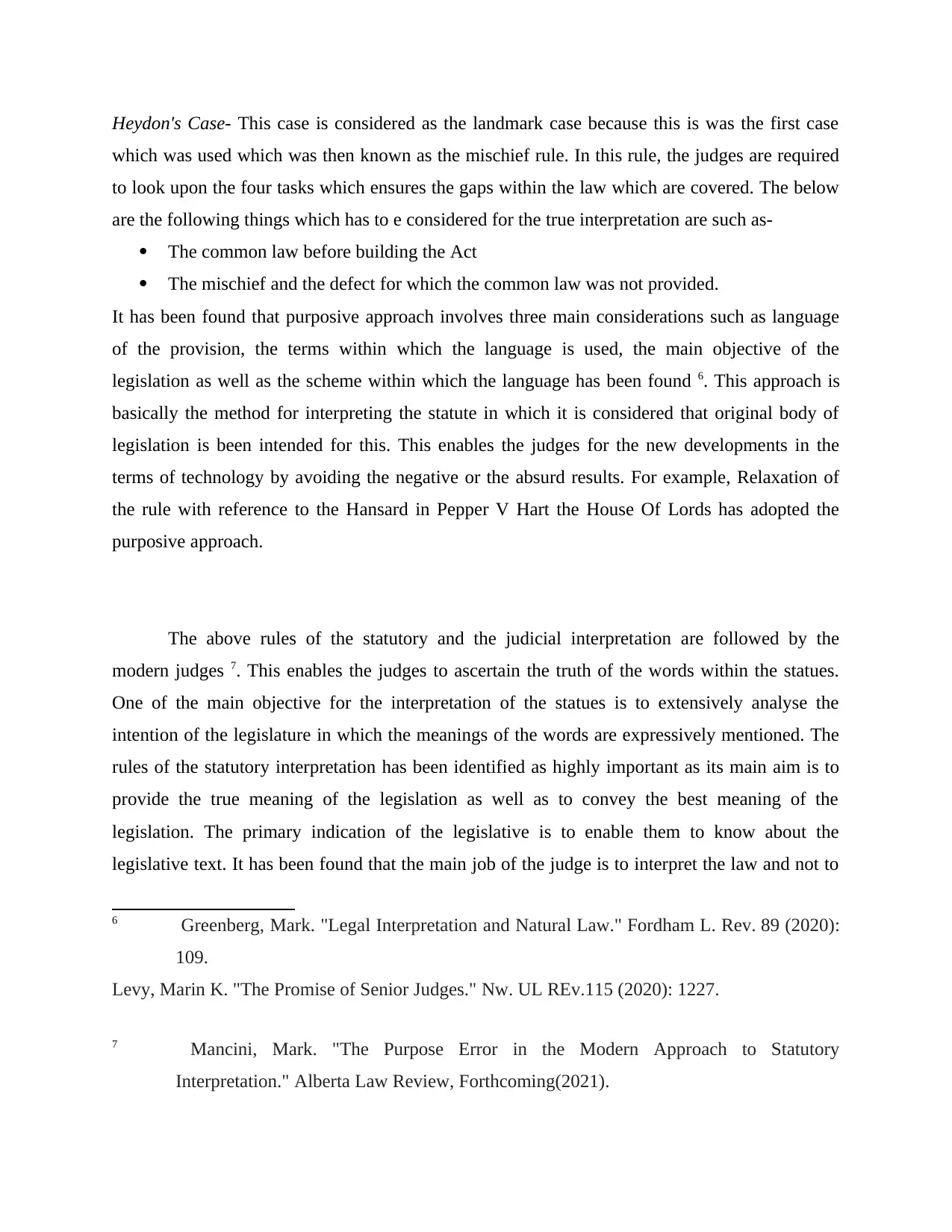
Heydon's Case- This case is considered as the landmark case because this is was the first case
which was used which was then known as the mischief rule. In this rule, the judges are required
to look upon the four tasks which ensures the gaps within the law which are covered. The below
are the following things which has to e considered for the true interpretation are such as-
The common law before building the Act
The mischief and the defect for which the common law was not provided.
It has been found that purposive approach involves three main considerations such as language
of the provision, the terms within which the language is used, the main objective of the
legislation as well as the scheme within which the language has been found 6. This approach is
basically the method for interpreting the statute in which it is considered that original body of
legislation is been intended for this. This enables the judges for the new developments in the
terms of technology by avoiding the negative or the absurd results. For example, Relaxation of
the rule with reference to the Hansard in Pepper V Hart the House Of Lords has adopted the
purposive approach.
The above rules of the statutory and the judicial interpretation are followed by the
modern judges 7. This enables the judges to ascertain the truth of the words within the statues.
One of the main objective for the interpretation of the statues is to extensively analyse the
intention of the legislature in which the meanings of the words are expressively mentioned. The
rules of the statutory interpretation has been identified as highly important as its main aim is to
provide the true meaning of the legislation as well as to convey the best meaning of the
legislation. The primary indication of the legislative is to enable them to know about the
legislative text. It has been found that the main job of the judge is to interpret the law and not to
6 Greenberg, Mark. "Legal Interpretation and Natural Law." Fordham L. Rev. 89 (2020):
109.
Levy, Marin K. "The Promise of Senior Judges." Nw. UL REv.115 (2020): 1227.
7 Mancini, Mark. "The Purpose Error in the Modern Approach to Statutory
Interpretation." Alberta Law Review, Forthcoming(2021).
which was used which was then known as the mischief rule. In this rule, the judges are required
to look upon the four tasks which ensures the gaps within the law which are covered. The below
are the following things which has to e considered for the true interpretation are such as-
The common law before building the Act
The mischief and the defect for which the common law was not provided.
It has been found that purposive approach involves three main considerations such as language
of the provision, the terms within which the language is used, the main objective of the
legislation as well as the scheme within which the language has been found 6. This approach is
basically the method for interpreting the statute in which it is considered that original body of
legislation is been intended for this. This enables the judges for the new developments in the
terms of technology by avoiding the negative or the absurd results. For example, Relaxation of
the rule with reference to the Hansard in Pepper V Hart the House Of Lords has adopted the
purposive approach.
The above rules of the statutory and the judicial interpretation are followed by the
modern judges 7. This enables the judges to ascertain the truth of the words within the statues.
One of the main objective for the interpretation of the statues is to extensively analyse the
intention of the legislature in which the meanings of the words are expressively mentioned. The
rules of the statutory interpretation has been identified as highly important as its main aim is to
provide the true meaning of the legislation as well as to convey the best meaning of the
legislation. The primary indication of the legislative is to enable them to know about the
legislative text. It has been found that the main job of the judge is to interpret the law and not to
6 Greenberg, Mark. "Legal Interpretation and Natural Law." Fordham L. Rev. 89 (2020):
109.
Levy, Marin K. "The Promise of Senior Judges." Nw. UL REv.115 (2020): 1227.
7 Mancini, Mark. "The Purpose Error in the Modern Approach to Statutory
Interpretation." Alberta Law Review, Forthcoming(2021).
⊘ This is a preview!⊘
Do you want full access?
Subscribe today to unlock all pages.

Trusted by 1+ million students worldwide
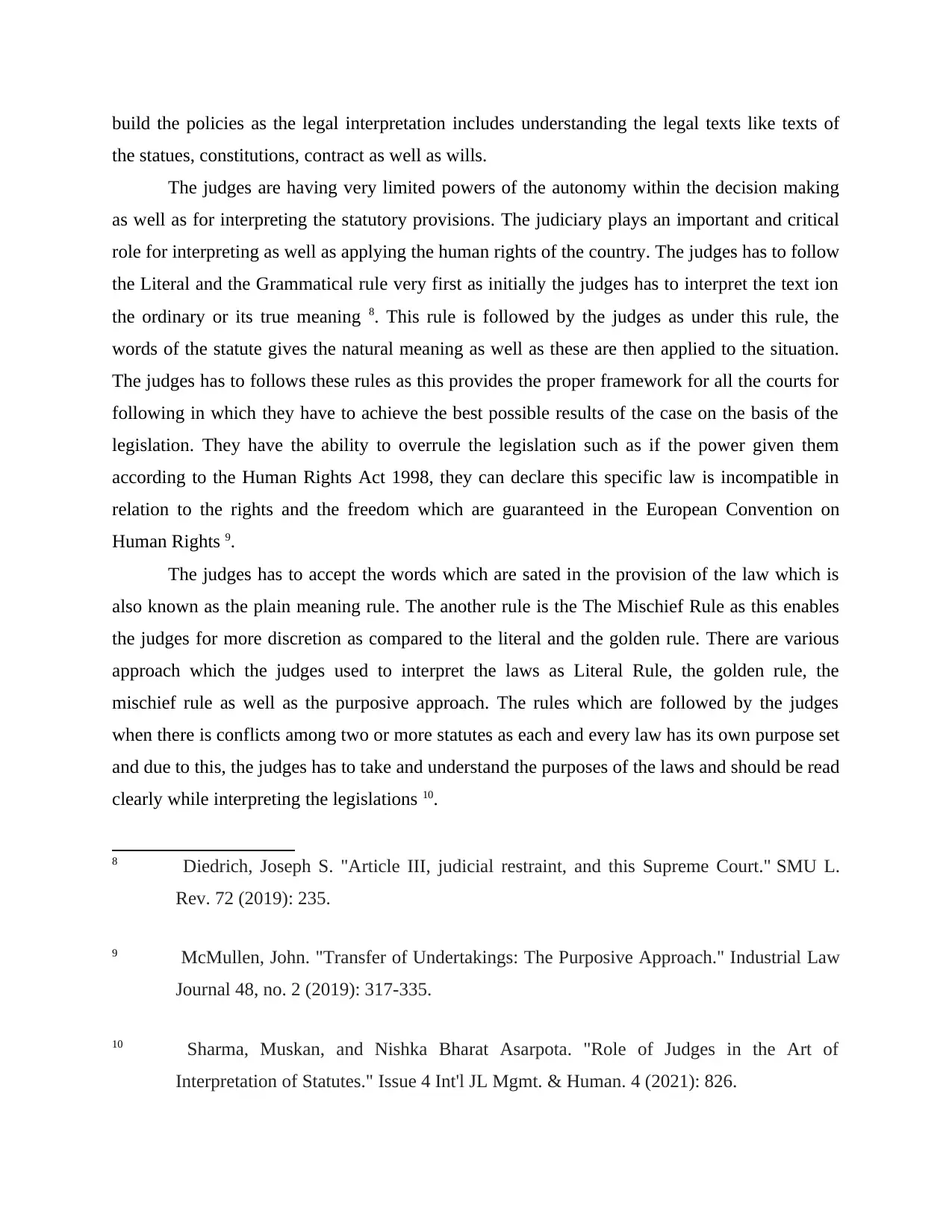
build the policies as the legal interpretation includes understanding the legal texts like texts of
the statues, constitutions, contract as well as wills.
The judges are having very limited powers of the autonomy within the decision making
as well as for interpreting the statutory provisions. The judiciary plays an important and critical
role for interpreting as well as applying the human rights of the country. The judges has to follow
the Literal and the Grammatical rule very first as initially the judges has to interpret the text ion
the ordinary or its true meaning 8. This rule is followed by the judges as under this rule, the
words of the statute gives the natural meaning as well as these are then applied to the situation.
The judges has to follows these rules as this provides the proper framework for all the courts for
following in which they have to achieve the best possible results of the case on the basis of the
legislation. They have the ability to overrule the legislation such as if the power given them
according to the Human Rights Act 1998, they can declare this specific law is incompatible in
relation to the rights and the freedom which are guaranteed in the European Convention on
Human Rights 9.
The judges has to accept the words which are sated in the provision of the law which is
also known as the plain meaning rule. The another rule is the The Mischief Rule as this enables
the judges for more discretion as compared to the literal and the golden rule. There are various
approach which the judges used to interpret the laws as Literal Rule, the golden rule, the
mischief rule as well as the purposive approach. The rules which are followed by the judges
when there is conflicts among two or more statutes as each and every law has its own purpose set
and due to this, the judges has to take and understand the purposes of the laws and should be read
clearly while interpreting the legislations 10.
8 Diedrich, Joseph S. "Article III, judicial restraint, and this Supreme Court." SMU L.
Rev. 72 (2019): 235.
9 McMullen, John. "Transfer of Undertakings: The Purposive Approach." Industrial Law
Journal 48, no. 2 (2019): 317-335.
10 Sharma, Muskan, and Nishka Bharat Asarpota. "Role of Judges in the Art of
Interpretation of Statutes." Issue 4 Int'l JL Mgmt. & Human. 4 (2021): 826.
the statues, constitutions, contract as well as wills.
The judges are having very limited powers of the autonomy within the decision making
as well as for interpreting the statutory provisions. The judiciary plays an important and critical
role for interpreting as well as applying the human rights of the country. The judges has to follow
the Literal and the Grammatical rule very first as initially the judges has to interpret the text ion
the ordinary or its true meaning 8. This rule is followed by the judges as under this rule, the
words of the statute gives the natural meaning as well as these are then applied to the situation.
The judges has to follows these rules as this provides the proper framework for all the courts for
following in which they have to achieve the best possible results of the case on the basis of the
legislation. They have the ability to overrule the legislation such as if the power given them
according to the Human Rights Act 1998, they can declare this specific law is incompatible in
relation to the rights and the freedom which are guaranteed in the European Convention on
Human Rights 9.
The judges has to accept the words which are sated in the provision of the law which is
also known as the plain meaning rule. The another rule is the The Mischief Rule as this enables
the judges for more discretion as compared to the literal and the golden rule. There are various
approach which the judges used to interpret the laws as Literal Rule, the golden rule, the
mischief rule as well as the purposive approach. The rules which are followed by the judges
when there is conflicts among two or more statutes as each and every law has its own purpose set
and due to this, the judges has to take and understand the purposes of the laws and should be read
clearly while interpreting the legislations 10.
8 Diedrich, Joseph S. "Article III, judicial restraint, and this Supreme Court." SMU L.
Rev. 72 (2019): 235.
9 McMullen, John. "Transfer of Undertakings: The Purposive Approach." Industrial Law
Journal 48, no. 2 (2019): 317-335.
10 Sharma, Muskan, and Nishka Bharat Asarpota. "Role of Judges in the Art of
Interpretation of Statutes." Issue 4 Int'l JL Mgmt. & Human. 4 (2021): 826.
Paraphrase This Document
Need a fresh take? Get an instant paraphrase of this document with our AI Paraphraser
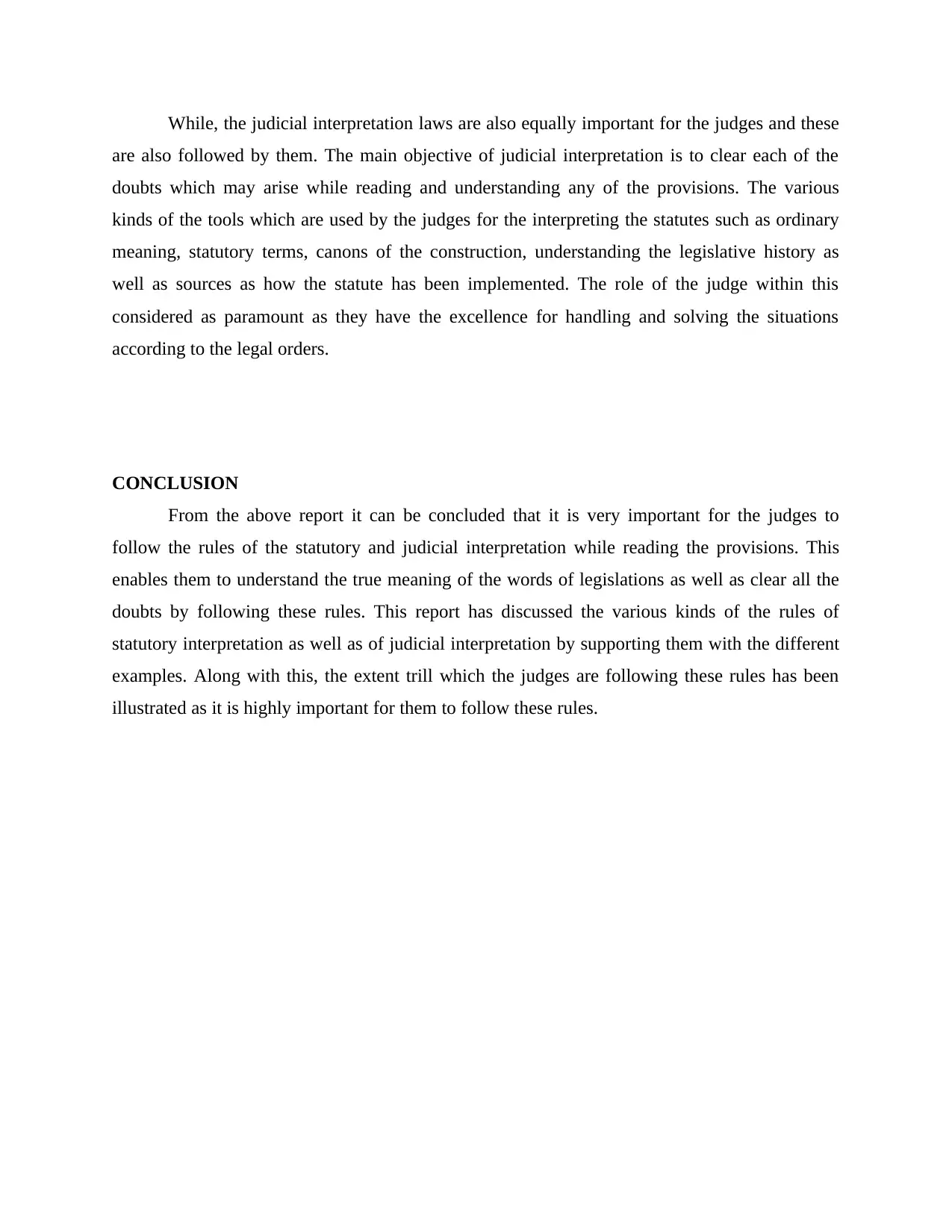
While, the judicial interpretation laws are also equally important for the judges and these
are also followed by them. The main objective of judicial interpretation is to clear each of the
doubts which may arise while reading and understanding any of the provisions. The various
kinds of the tools which are used by the judges for the interpreting the statutes such as ordinary
meaning, statutory terms, canons of the construction, understanding the legislative history as
well as sources as how the statute has been implemented. The role of the judge within this
considered as paramount as they have the excellence for handling and solving the situations
according to the legal orders.
CONCLUSION
From the above report it can be concluded that it is very important for the judges to
follow the rules of the statutory and judicial interpretation while reading the provisions. This
enables them to understand the true meaning of the words of legislations as well as clear all the
doubts by following these rules. This report has discussed the various kinds of the rules of
statutory interpretation as well as of judicial interpretation by supporting them with the different
examples. Along with this, the extent trill which the judges are following these rules has been
illustrated as it is highly important for them to follow these rules.
are also followed by them. The main objective of judicial interpretation is to clear each of the
doubts which may arise while reading and understanding any of the provisions. The various
kinds of the tools which are used by the judges for the interpreting the statutes such as ordinary
meaning, statutory terms, canons of the construction, understanding the legislative history as
well as sources as how the statute has been implemented. The role of the judge within this
considered as paramount as they have the excellence for handling and solving the situations
according to the legal orders.
CONCLUSION
From the above report it can be concluded that it is very important for the judges to
follow the rules of the statutory and judicial interpretation while reading the provisions. This
enables them to understand the true meaning of the words of legislations as well as clear all the
doubts by following these rules. This report has discussed the various kinds of the rules of
statutory interpretation as well as of judicial interpretation by supporting them with the different
examples. Along with this, the extent trill which the judges are following these rules has been
illustrated as it is highly important for them to follow these rules.
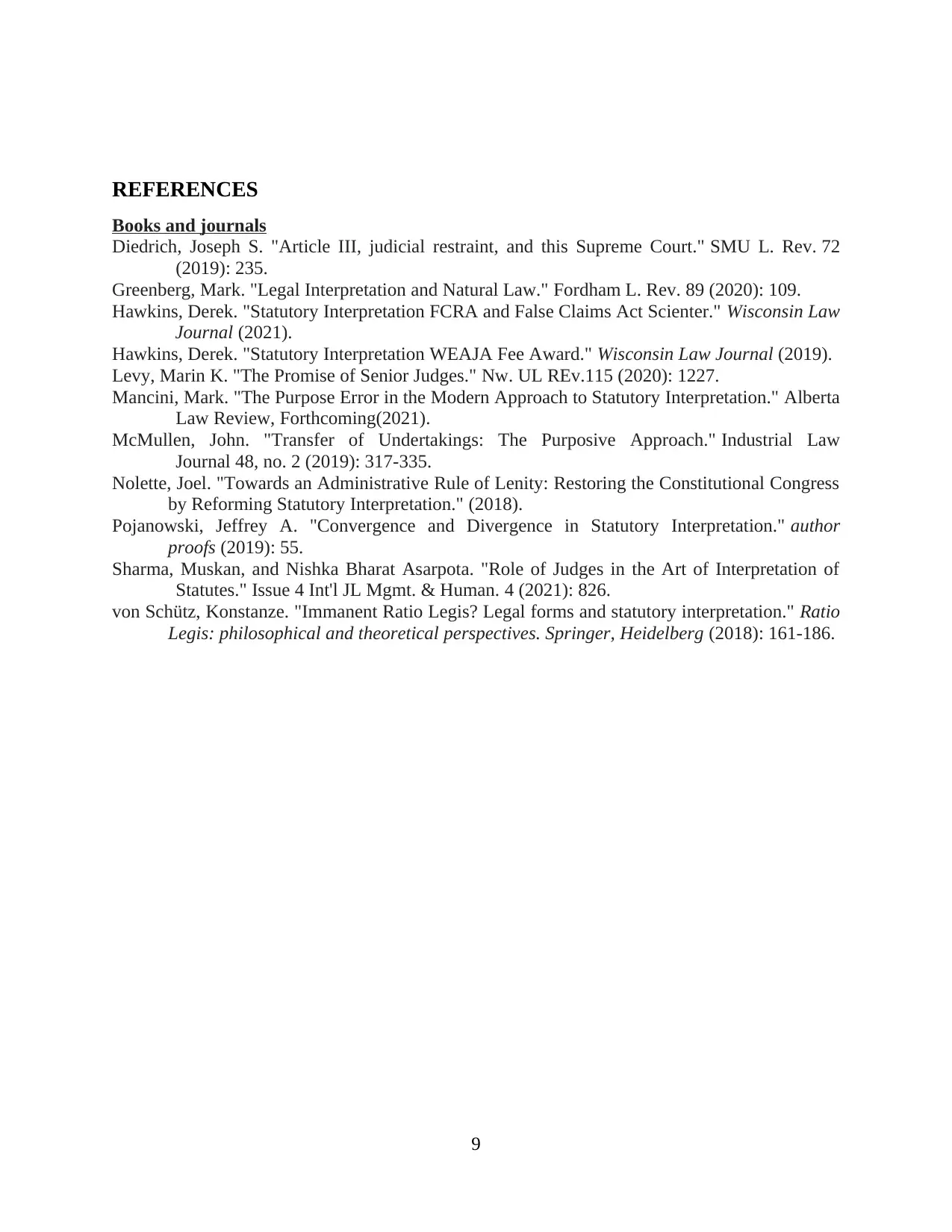
REFERENCES
Books and journals
Diedrich, Joseph S. "Article III, judicial restraint, and this Supreme Court." SMU L. Rev. 72
(2019): 235.
Greenberg, Mark. "Legal Interpretation and Natural Law." Fordham L. Rev. 89 (2020): 109.
Hawkins, Derek. "Statutory Interpretation FCRA and False Claims Act Scienter." Wisconsin Law
Journal (2021).
Hawkins, Derek. "Statutory Interpretation WEAJA Fee Award." Wisconsin Law Journal (2019).
Levy, Marin K. "The Promise of Senior Judges." Nw. UL REv.115 (2020): 1227.
Mancini, Mark. "The Purpose Error in the Modern Approach to Statutory Interpretation." Alberta
Law Review, Forthcoming(2021).
McMullen, John. "Transfer of Undertakings: The Purposive Approach." Industrial Law
Journal 48, no. 2 (2019): 317-335.
Nolette, Joel. "Towards an Administrative Rule of Lenity: Restoring the Constitutional Congress
by Reforming Statutory Interpretation." (2018).
Pojanowski, Jeffrey A. "Convergence and Divergence in Statutory Interpretation." author
proofs (2019): 55.
Sharma, Muskan, and Nishka Bharat Asarpota. "Role of Judges in the Art of Interpretation of
Statutes." Issue 4 Int'l JL Mgmt. & Human. 4 (2021): 826.
von Schütz, Konstanze. "Immanent Ratio Legis? Legal forms and statutory interpretation." Ratio
Legis: philosophical and theoretical perspectives. Springer, Heidelberg (2018): 161-186.
9
Books and journals
Diedrich, Joseph S. "Article III, judicial restraint, and this Supreme Court." SMU L. Rev. 72
(2019): 235.
Greenberg, Mark. "Legal Interpretation and Natural Law." Fordham L. Rev. 89 (2020): 109.
Hawkins, Derek. "Statutory Interpretation FCRA and False Claims Act Scienter." Wisconsin Law
Journal (2021).
Hawkins, Derek. "Statutory Interpretation WEAJA Fee Award." Wisconsin Law Journal (2019).
Levy, Marin K. "The Promise of Senior Judges." Nw. UL REv.115 (2020): 1227.
Mancini, Mark. "The Purpose Error in the Modern Approach to Statutory Interpretation." Alberta
Law Review, Forthcoming(2021).
McMullen, John. "Transfer of Undertakings: The Purposive Approach." Industrial Law
Journal 48, no. 2 (2019): 317-335.
Nolette, Joel. "Towards an Administrative Rule of Lenity: Restoring the Constitutional Congress
by Reforming Statutory Interpretation." (2018).
Pojanowski, Jeffrey A. "Convergence and Divergence in Statutory Interpretation." author
proofs (2019): 55.
Sharma, Muskan, and Nishka Bharat Asarpota. "Role of Judges in the Art of Interpretation of
Statutes." Issue 4 Int'l JL Mgmt. & Human. 4 (2021): 826.
von Schütz, Konstanze. "Immanent Ratio Legis? Legal forms and statutory interpretation." Ratio
Legis: philosophical and theoretical perspectives. Springer, Heidelberg (2018): 161-186.
9
⊘ This is a preview!⊘
Do you want full access?
Subscribe today to unlock all pages.

Trusted by 1+ million students worldwide
1 out of 9
Related Documents
Your All-in-One AI-Powered Toolkit for Academic Success.
+13062052269
info@desklib.com
Available 24*7 on WhatsApp / Email
![[object Object]](/_next/static/media/star-bottom.7253800d.svg)
Unlock your academic potential
Copyright © 2020–2026 A2Z Services. All Rights Reserved. Developed and managed by ZUCOL.





